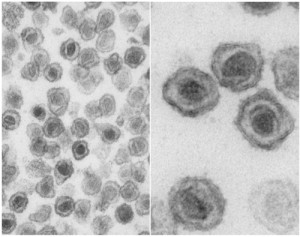 Hosts: Vincent Racaniello and W. Ian Lipkin
Hosts: Vincent Racaniello and W. Ian Lipkin
Vincent and Ian review a multicenter blinded analysis which finds no association between chronic fatigue syndrome/myalgic encephalomyelitis and XMRV or polytropic murine leukemia virus.
Click the arrow to play, or right-click to download TWiV Special XMRV (53 MB .mp3, 44 min)
Subscribe (free): iTunes, RSS, email
Links for this episode:
- Transcript of this episode (pdf)
- Multicenter blinded analysis of CFS and XMRV/pMLV (mBio)
- Press release on multicenter study (pdf)
- Press conference webcast
- TWiV on Facebook
Send your virology questions and comments to twiv@microbe.tv.


Cant download the MP3. Error 404 Not Found
cant even listen to it not working
Not working
Has anyone ordered a TWIV iphone case?
Thanks for doing this interview – looking forward to hearing it once it’s working!
Since Polio, no illness including the most arguable illness/HIV-AIDS in which researchers still to this day argue over the cause or theory will there not be any cures available. There is not a large profit margin to cure any illness. When illness overwhelms the masses into anger of loss of a loved one, usually that person moves on with his or her life. This is the cynical atmosphere of the big PHRMA Industry.
Waste $10 million of taxpayers money disproving an already disproved theory a year after everyone else had forgotten about it? THAT is a paradigm? Buy a dictionary!
That is how much these things cost, it happens all the time in the field of science.
Given how much money is spend on other illnesses, (hundreds of millions of USD per year by the NIH for diseases with similar societal disease burden), comments about the cost seem out of place.
Yes it was, they will have to do it again now with ME patients.
Thank you, Dr. Racaniello, for covering this final chapter in the XMRV story, and for asking the important questions. Thanks to Dr. Lipkin for doing a rigorous blinded replication study with a well-characterized patient cohort, which was key to answering the question of association of XMRV & pMLV with ME/CFS once and for all.
I would like to think that it wasn’t just the patient community that looked for scientific rigor in trying to replicate the initial findings. I’d like to think that ANY time a group of reputable scientists finds what looks like another infectious human retrovirus associated with disease, that the scientific community would want to be very careful in their replication studies before they rule it out. I always thought that scientific method called for hypothesis, test, and replication. To me, this whole XMRV saga looks like the way science is supposed to work.
Some members of the scientific community, like you, Dr. Racaniello, and John Coffin, urged the patient community to have patience and wait until the science played out. We did and it has. But it looks like some members of the scientific community need to hear that, too. Such as the ones who think that doing a true replication study was a waste of money. Especially when people’s lives are at stake.
That was inspiring, I learned great lessons today about doing good science and accepting new evidence and moving on. Dr Lipkin and his team did a great job but I have to say that Dr Mikovits being part of this effort really made me admire her strength.
thank you so much, Dr Racaniello for this special TWIV.
From a ME/CFS patient perspective, this journey in virology, has been at the least like a roller coaster. i was just finding out I had the disease when the Lombardi et al. paper came out.
As you know there has been a lot of vitriol from patient groups, sometimes from scientists and also often from the press.
however I hae found that the best outcome came today from a very professional Ian Lipkin and from taking the time to record TWIV on this topic. In the end, there are no villains, there is consensus, and from my point of view, there is certainty that I do not have a retrovirus that could be passed on-which is a scary thought ( though there may be other pathogens)
Patients need to know that there is quite a few teams working on etiology, physiopathology, immunology, and drug trials (Amplligen and Rituximab,which I am currently on) and there is hope on the horizon. however scientists need to know that they are needed to elucidate this mystery. In Canada, a patient survey counted 200 000 pts with ME/CFS and in 2010 according to the same methodology national survey, they counted 411 500 of us. The canadian government has no answer as of whether this is because there is more awareness, or our immune systems are getting worse as time goes bad or whether there is a pathogen on the loose, or all of the above.
It is through education like what you have done through Twiv and better journalism that the society, governments, physicians and schools can be educated and that stigma can be dismantled.
Again thank you.
Thanks to Dr Lipkin and colleagues for following this study through to the end. I am also pleased to see that they are providing access to blood samples of this well-characterised cohort.
Thanks to Dr Racaniello for covering this issue and keeping an open mind until the end.
I am also pleased to note that the prostate cancer association has also been retracted, so the scientists involved can finally move on.
http://www.plospathogens.org/article/info%3Adoi%2F10.1371%2Fjournal.ppat.0020025
It is important to note that we need to redouble the message that more research is needed for CFS. In terms of disease burden in the US (DALYs), CFS is under-funded by a magnitude of order, that is the NIH would be funding at over ten times the amount if it was ANY other disease. The NIH has a mandate to consider disease burden when allocating funds, and so this is something that needs to change!
Yes, a movie is called for. It should be based on the life of Dr. Peterson. Take it from the outbreak in the affluent Incline Village, how he was maligned, alliances and divorces, discoveries disproven, again and again. Add to that government corruption, government apathy. It’s rich. The DeFrietas discovery and her accident and poor health that derailed her effort. Reeves being removed. And to boot, his death just days before his presumptuous comments (that led to his leaving the position to take another) proved to be correct.
Don’t forget to include Hillary, who wrote the book on the early history. She also becomes part of the story.
The patient organizations, their failures and successes, divisions and alliances. Advocacy efforts severely limited by lack of resources and the limitations of the illness itself. How many patient organizations have health people running it or working for it? I know of only one, and they are very small, relative to patient organizations for other diseases.
And then, there is Judy, a fiery researcher who didn’t follow researcher politeness, bold and determined in her beliefs and unusual care and contact with patients, but who always wanted to find the truth – knowing the truth would set patients free. Despite her vitriol in the past, when she was found to be wrong, she publicly said so.
Peterson is weaved through the whole history. Tell it from his perspective and you see drama and twists that are more unbelievable than anything written in fiction.
I vote for Robert Redford to play Peterson. He even looks like him:
Know any screen writers?
Dot your “i”s and cross your “t”s. For every figure you propose in a paper…have three in your notebook that back up your claim. When you submit a ground-breaking publication, especially if you don’t have lengthy track-record in that specified subject be prepared to defend it with data.
This and the the recent Aresenic-only bacterium debacle raise three concerns that are increasing in recent years and are attributing to bad science.
1. the rush and pressure to publish is making for sloppy science and in turn some manuscript submissions in even high-tier journals are horrifically written when they reach the pre-publishing review stage
2. One should be careful when publishing tentative or preliminary findings, for every figure in a paper you should have 2-3 confirmation experiments in your notebook for peace of mind and as “ammo” against that crabby reviewer who doesn’t like certain aspects of your paper.
3. In science we do not set out to prove or disprove. One must follow the scientific method. One must also realize the strengths and limitations of their particular experimental design. Making great “leaps” in your interpretation based solely on PCR, a Western blot or flashy immunofluorescent images needs to be made with a certain sense of reservation.
Take the approach that a publication is “forever” do you want some grad student 20 yrs from now looking at one of your papers and saying, “oh wow, they got this totally wrong!”?
Torture all the science all you want but people with this illness are tired of all the hoopla.
The facts remain, people are dying. What are the scientists doing about it?
Where is the assay to determine what is the cause?
Until someone changes the name to something as hideous as disease it is. Similar to what they did with Ebola Virus at WHO only then will un-tortured science prevail. CFIDS/ME rode piggyback to HIV-AIDS in the sixties and like all living things its molecular structure is not in the field of Virology. Trying to put a square peg into a circle is the impossible. More of our tax money spent on Virology. Let sleeping dogs lie.
This illness is genetic, it belongs in that field. DNA tells us so.
So the Lipkin study was PCR and serology positive, but the patients are unlikely to have had ME. Good job. So when do we bring in the real virus hunters?
“All gag-positive cDNA samples were negative for mouse IAP sequences.”
The clinicians really let ME patients down by changing the Canadian criteria and not requiring the main feature of ME. So who were they studying? EBV patients?
Those clinicians have proven they know nothing about this neuroimmune disease.